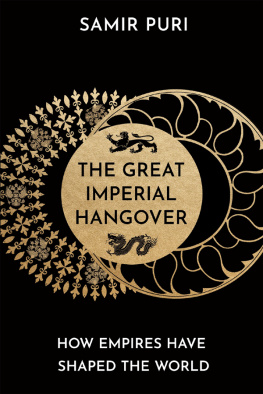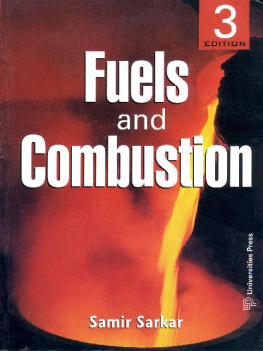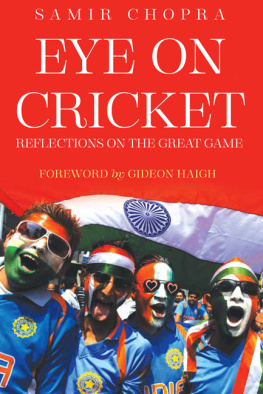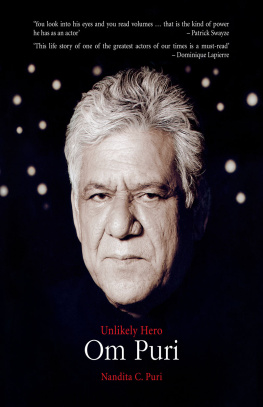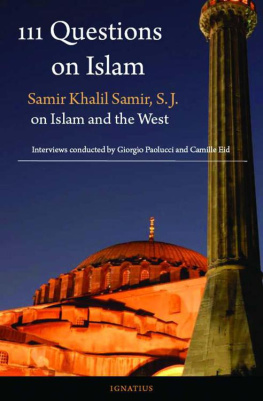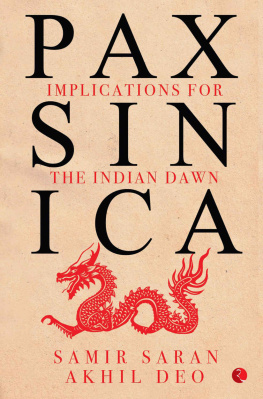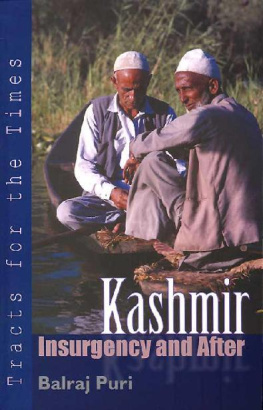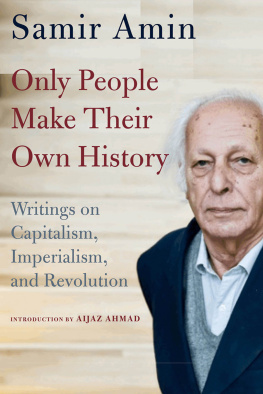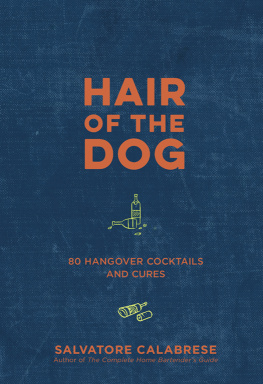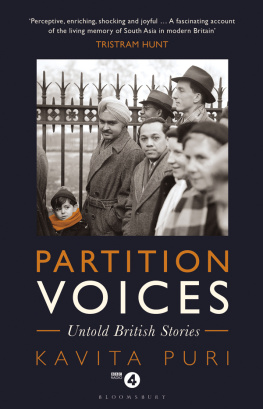Samir Puri - The Great Imperial Hangover
Here you can read online Samir Puri - The Great Imperial Hangover full text of the book (entire story) in english for free. Download pdf and epub, get meaning, cover and reviews about this ebook. year: 2020, publisher: Atlantic Books, genre: Politics. Description of the work, (preface) as well as reviews are available. Best literature library LitArk.com created for fans of good reading and offers a wide selection of genres:
Romance novel
Science fiction
Adventure
Detective
Science
History
Home and family
Prose
Art
Politics
Computer
Non-fiction
Religion
Business
Children
Humor
Choose a favorite category and find really read worthwhile books. Enjoy immersion in the world of imagination, feel the emotions of the characters or learn something new for yourself, make an fascinating discovery.
- Book:The Great Imperial Hangover
- Author:
- Publisher:Atlantic Books
- Genre:
- Year:2020
- Rating:3 / 5
- Favourites:Add to favourites
- Your mark:
- 60
- 1
- 2
- 3
- 4
- 5
The Great Imperial Hangover: summary, description and annotation
We offer to read an annotation, description, summary or preface (depends on what the author of the book "The Great Imperial Hangover" wrote himself). If you haven't found the necessary information about the book — write in the comments, we will try to find it.
The Great Imperial Hangover — read online for free the complete book (whole text) full work
Below is the text of the book, divided by pages. System saving the place of the last page read, allows you to conveniently read the book "The Great Imperial Hangover" online for free, without having to search again every time where you left off. Put a bookmark, and you can go to the page where you finished reading at any time.
Font size:
Interval:
Bookmark:

THE GREAT IMPERIAL HANGOVER
About the Author
SAMIR PURI is Adjunct Professor in the Johns Hopkins School of Advanced International Studies and Visiting Lecturer in Kings College Londons War Studies department. He has advised the Ministry of Defence on global strategic trends and the Commonwealth Secretariat on countering violent extremism. Before academia he served in the Foreign Office (200915) and began his career at RAND (200609). He appears on news programmes for Al Jazeera, the BBC, CNBC, Sky and TRT World, and has written for publications including the Guardian.

Published in hardback and trade paperback in Great Britain in 2020 by Atlantic Books, an imprint of Atlantic Books Ltd.
Copyright Samir Puri, 2020
The moral right of Samir Puri to be identified as the author of this work has been asserted by him in accordance with the Copyright, Designs and Patents Act of 1988.
All rights reserved. No part of this publication may be reproduced, stored in a retrieval system, or transmitted in any form or by any means, electronic, mechanical, photocopying, recording, or otherwise, without the prior permission of both the copyright owner and the above publisher of this book.
Every effort has been made to trace or contact all copyright holders. The publishers will be pleased to make good any omissions or rectify any mistakes brought to their attention at the earliest opportunity.
10 9 8 7 6 5 4 3 2 1
A CIP catalogue record for this book is available from the British Library.
Hardback ISBN: 978 1 78649 832 8
Trade paperback ISBN: 978 1 83895 025 5
E-book ISBN: 978 1 78649 834 2
Printed in Great Britain
Atlantic Books
An imprint of Atlantic Books Ltd
Ormond House
2627 Boswell Street London
WC1N 3JZ
www.atlantic-books.co.uk
For my grandfather
Kishori Lal Dhiri (19141990)
who spanned three continents and one empire
W e are in the first empire-free millennium in world history since ancient times, but the world remains in the throes of a great imperial hangover. Empires are still shaping the twenty-first century in profound ways through their abiding influences on present generations. The purpose of this book is to identify these legacies and explain why understanding the worlds history of empire can help to unlock many of the most troublesome conundrums in contemporary global affairs.
Even a cursory glance at the news suggests that the world appears to have gone mad or, at the very least, to have lost the semblance of regularity that makes us feel safe. Terrorism, Trump and Brexit have led many people to question the coherence of the Western world; Turkey and Russia slip deeper into authoritarian rule; war tears at the fabric of the Middle East and parts of Africa; a vast exodus of refugees flee for a better shot at life; and all the while Chinas economic tentacles spread further across the globe. Barely one-fifth of our way into the twenty-first century, it is not unreasonable to seek explanations as to what world order means today, and how we can strive towards it.
Why turn to the apparently fusty legacy of empires to explain todays uncertainties? The end of the worlds many empires is no longer at the forefront of our minds, overtaken by more pressing concerns about what lies round the next corner. And yet empires continue to haunt our minds in all manner of ways, stalking our subconscious understanding of who we are and of our place in the world. Empires have helped to construct national identities and carve out geopolitical realities and mentalities that prove hard to escape. This is as true for those whose great-grandparents were imperialists as it is for those whose countries have lived through subjugation and national liberation. Cities, institutions and infrastructure were built in the name of empires. Borders were hastily drawn and populations rearranged. Assets were stripped to enrich the colonizers at the expense of the colonized.
Merely to point out that the past has an influence on the present is too obvious. The real prize is in learning how this influence is being felt, and in working out what we can do to better fathom and manage the wars, terrorism, political shocks and global tensions that dominate our headlines. While this book is rooted in historical experiences, it is fundamentally forward-looking. It is not concerned with extensive retellings of imperial histories, although I will provide some summaries where necessary. Nor will I provide a running commentary on the minutiae of todays turbulent politics. Rather, this book straddles history and current affairs. It asks: how do the lingering half-lives of collapsed empires continue to shape such matters as security, foreign policy, international aid and global commerce today?
I will avoid picking any one national perspective, or picking sides in arguments that either categorically denounce or whitewash imperial legacies. Instead I will embark on a world tour, taking in the many varied post-imperial experiences of Europe, Asia, America, the Middle East and Africa. I will not argue that we are entering a new imperial age. Rather, my argument can be expressed concisely: twenty-first-century world order is a story of many intersecting post-imperial legacies. When these legacies collide, misunderstanding, friction, schism or even war can result.
This book is a plea to have greater awareness, as individuals and nations, of how our varied imperial pasts have contributed to why we see the world in such different ways. Our perceptions and beliefs concerning empires are coloured by our own inherited backgrounds, which is why there are rarely right or wrong answers to the questions that empires have thrown up.
Hence my own motivations for writing this book. My family roots are in Britains former East African and Indian colonies, which means that my relatives were on the receiving end of British colonialism. Generations later, no matter how assimilated I might feel in contemporary Britain, I retain some identification with non-white regions of the world once subjugated by the British Empire. Innate, unspoken and familial, this is more an awareness of my roots than the stuff of rebellion. Indeed, I took a patriotic career path and signed up to serve the British Foreign Office in a role that would certainly have been closed to my ancestors.
The very fact that I could join the Foreign Office, and work on international security issues, shows that Britain has progressed substantially in the intervening decades since my family arrived after decolonization. Ethnic minorities in modern Britain can expect to receive far warmer welcomes than their parents did, which has meant that even though I was born in ethnically diverse and impoverished east London, I too could become an Englishman, just so long as I followed the cultural cues. Later, as a civil servant, I was proud to serve my country, but the experience left me with lingering questions around identity both my own identity and Britains national identity in a rapidly changing world, given what seem to me to be the lingering anachronisms in the mentalities of its elite institutions of state and academia.
And there my thoughts might have stopped, but for war erupting in Ukraine in 2014. I spent a year there, monitoring what was happening on the front line as part of an international diplomatic mission. We were not peacekeepers, so we had no means to stop the fighting, only to try and prevent things escalating further. Russia was clearly an aggressor, destabilizing a country that was part of its historical empire, with the goal of preventing Ukraines government from drawing closer to the European Union a club of democratic states that, despite lacking the motivations of the empires of old, had acquired its own empire-like traits, not least in its incessant expansion.
Font size:
Interval:
Bookmark:
Similar books «The Great Imperial Hangover»
Look at similar books to The Great Imperial Hangover. We have selected literature similar in name and meaning in the hope of providing readers with more options to find new, interesting, not yet read works.
Discussion, reviews of the book The Great Imperial Hangover and just readers' own opinions. Leave your comments, write what you think about the work, its meaning or the main characters. Specify what exactly you liked and what you didn't like, and why you think so.

